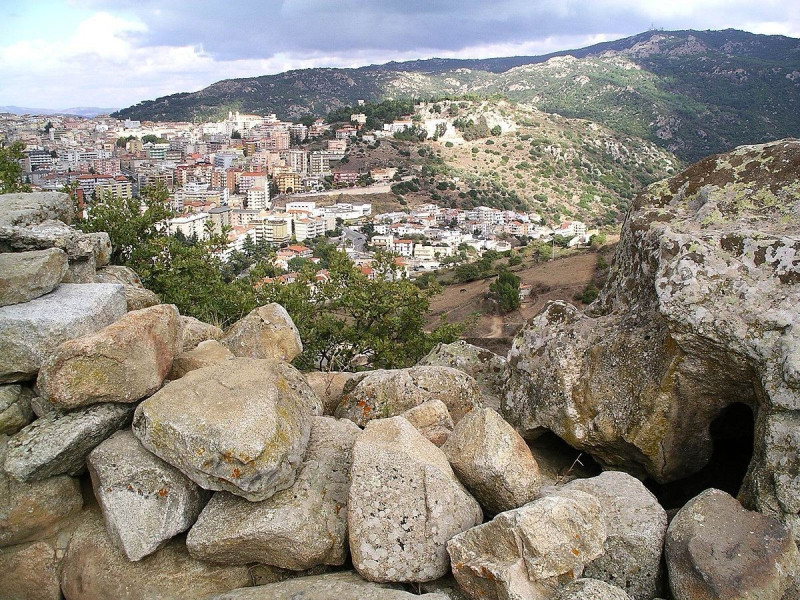Nuoro
Nuoro (Italian pronunciation: [ˈnu.oɾo] ( ), Sardinian: Nùgoro [ˈnuɣoɾo]) is a city and comune (municipality) in central-eastern Sardinia, Italy, situated on the slopes of the Monte Ortobene. It is the capital of the province of Nuoro. With a population of 36,347 (2011), it is the sixth-largest city in Sardinia. Birthplace of several renowned artists, including writers, poets, painters, and sculptors, Nuoro hosts some of the most important museums in Sardinia. It is considered an important cultural center of the region and it has been referred as the "Atene sarda" (Sardinian Athens). Nuoro is the hometown of Grazia Deledda, the first and only Italian woman to win (1926) the Nobel Prize in Literature. History The earliest traces of human settlement in the Nuoro area (called " the Nuorese") are the so-called Domus de janas, rock-cut tombs dated at the third millennium BC. However, fragments of ceramics of the Ozieri culture have also been discovered and dated at c. 3500 BC. The Nuorese was a centre of the Nuragic civilization (which developed in Sardinia from c. 1500 BC to c. 250 BC), as attested by more than 30 Nuragic sites, such has the village discovered in the countryside of Tanca Manna, just outside Nuoro, which was made of about 800 huts. The Nuorese was crossed by a Roman road which connected Karalis (Cagliari) to Ulbia (Olbia). The legacy of the Roman colonization can especially be found in the variety of the Sardinian language which is still spoken today in Nuoro: Sardu nugoresu is considered the most conservative language of the Romance family. After the fall of the Western Roman Empire, Sardinia was held first by the Vandals and then by the Byzantines. According to the letters of Pope Gregory I, a Romanized and Christianized culture (that of the provinciales) co-existed with several Pagan cultures (those of the Gens Barbaricina, i.e. "Barbarian People") mainly located in the island's interior. As the Byzantine control waned, the Giudicati appeared. A small village known as Nugor appears on a medieval map from 1147. In the two following centuries it grew to more than 1000 inhabitants. Nuoro remained a town of average importance under the Aragonese and Spanish domination of Sardinia, until famine and plague struck it in the late 17th century. After the annexation to the Kingdom of Sardinia, the town became the administrative center of the area, obtaining the title of city in 1836. Culture Museums Museo Archeologico Nazionale (National Archeological Museum). Museo Deleddiano (Grazia Deledda's Museum). Museo Etnografico Sardo (Sardinian Museum of Ethnography). M.A.N., Museo d’Arte Provincia di Nuoro (Provincial Modern Art Museum). Language Sardo Logudorese is also spoken in Nuoro, in its variant called Nugoresu. Transportation Nuoro is served by the SS 131 DCN (Olbia-Abbasanta), the SS 129 (Orosei-Macomer), and the SS 389 (Monti-Lanusei). It is connected by train (FdS) to Macomer and by bus (ARST, Azienda Regionale Sarda Trasporti) to Cagliari, Sassari, Olbia, and to several minor centres in the province and the region. ATP Nuoro's bus system provides service within the city. People Antonio Ballero (1864–1932), writer, painter Francesco Ciusa (1883–1949), sculptor Giovanni Ciusa Romagna (1907–1958), painter Attilio Deffenu (1890–1918), trade unionist Grazia Deledda (1871–1936), writer Pasquale Dessanai (1868–1919), poet Marcello Fois (born 1960), writer Maria Giacobbe (born 1928), writer and essayist Flavio Manzoni, car designer Franco Oppo (born 1935), composer Romano Ruiu (1935–1974), writer, poet, playwright Salvatore Satta (1902–1975), jurist, writer Sebastiano Satta (1867–1914), poet, lawyer Salvatore Sirigu (born 1987), footballer Twin towns Corte, France Tolmezzo, Italy References External links Official Website (Italian) Official (Municipality) Tourism Website (Italian) Official (Region) Tourism Website (English)

